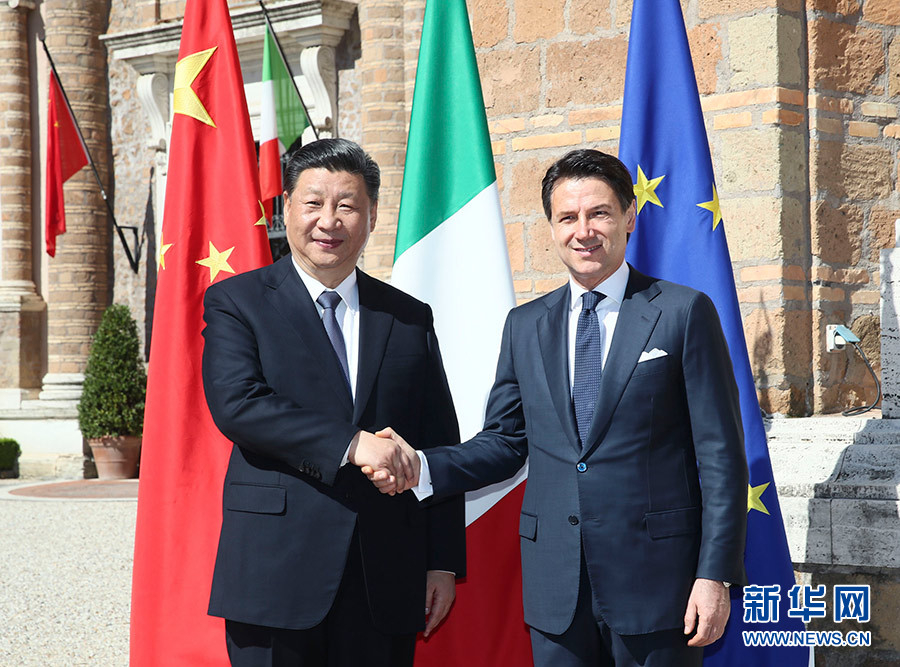
Opinion
11:21, 27-Mar-2019
China's BRI is a feather in world's cap
Ken Moak

Editor's note: Ken Moak taught economic theory, public policy and globalization at the university level for 33 years, co-authored a book titled "China's Economic Rise and Its Global Impact" in 2015. The article reflects the author's opinion, and not necessarily the views of CGTN.
On March 23, Chinese President Xi Jinping met with Italian Prime Minister Giuseppe Conte. On the same day, they witnessed the signing of a memorandum of understanding (MoU) to advance the construction of the Belt and Road, which makes Italy become the first G7 country that joins China's Belt and Road Initiative (BRI).
It doesn't make any sense to criticize China's BRI
The United States relentlessly demonizes China and its BRI, labeling the country the greatest threat to America and the BRI as "debt traps" for participating countries. To maximize the effects of its propaganda, the U.S. government enlisted scholars, think tanks and mainstream media to fan the anti-Chinese government rhetoric. Presumably, their "expertise" would give it "credence."
What the U.S. media, pundits and government failed to mention is that their anti-China rhetoric is insulting to Italy, suggesting its government is naive when signing the MoU with China on joining the BRI. They ignored the fact that the government might have studied the economic and political consequences of joining the BRI because it is a close ally of the U.S., being a G7 and NATO member. It is also probable that the Italian government had explored other avenues to pull the economy out of the recession.

Chinese President Xi Jinping meets with Italian Prime Minister Giuseppe Conte in Rome, Italy, March 23, 2019. /Xinhua Photo
Chinese President Xi Jinping meets with Italian Prime Minister Giuseppe Conte in Rome, Italy, March 23, 2019. /Xinhua Photo
Further, the accusations that the anti-China crowd in the U.S. and some in the EU against the BRI were dismissed as rhetorical nonsense. For example, the 99-year lease of Hambantota Port to a Chinese company by Sri Lanka was a commercial decision to increase shipping traffic and attracting third country investments. The Chinese company also has expertise in managing and operating seaports.
Indeed, both materialize in that the Chinese company did bring in more traffic and attract investment. Gulf News revealed on March 24, 2019 that Oman Oil Company is investing at the Hambantota Port, reporting the oil minister Bin Hamad Al Rumhy joined Sri Lankan Prime Minister Ranil Wickremesinghe at a ceremony to lay the foundation stone for a planned 3.85 billion U.S. dollars refinery.
Paying with resources in case of payment default cannot be considered as "debt trap" because the host country is receiving market values for the commodities. The arrangement, in fact, could be construed as "pragmatic" partnership because the host country attains development funds and China increases its resource security, resulting in a "win-win" situation.
The BRI is not what its critics portray it
The fact of the matter is that the Italian government (and the growing number of countries signing on to the BRI) are pursuing their national interests. The Italian economy is in a deep recession with no help coming from the U.S. or EU. Indeed, they are in economic and financial troubles themselves. For example, the EU's economic growth is expected to be below 2 percent in 2019 because of the ongoing U.S.-China trade war and debt problems in the region. The U.S. fared better, but not much better with the year's growth rate drops from 3 percent in 2018 to 2.5 percent and 1.8 percent respectively in 2019 and 2020, according to World Bank figures.
The BRI is not perfect, but it is a pragmatic vehicle for promoting global economic prosperity. Two-way trade between China and the participating countries have reached over 5 trillion U.S. dollars in 2018 since its inception in 2013. That number is poised to rise because more and more countries are planning to join or participating in this year's BRI forum.

AIIB's headquarter building in Beijing /VCG Photo
AIIB's headquarter building in Beijing /VCG Photo
Chinese investment in the BRI exceeded 100 billion U.S. dollars in 2018, prompting U.S.-based investment bank Morgan Stanley to predict the figure would mushroom to 1.3 trillion U.S. dollars by 2027. Spending this huge amount of money on infrastructures and industries should benefit all participating nations because of the efficiencies and enormous economies of scale it will bring.
Indeed, many African, European, Latin American, Asian and other economies indicated that had it not for the BRI, they might not be what they are today. Greece's economy, for example, grew nearly 2 percent in 2018 in large part because of Chinese investment. Ethiopia's ambassador to China Teshome Toga Chanaka insisted that it makes sense to sign on to the BRI and that it is not a "debt trap." Even staunch U.S. ally and Trump soulmate, Jair Bolsonaro, attested that China is important to Brazil's economic well-being.
It is interesting to note that G7 countries that are most critical of China and its BRI – the U.S., the UK, France, Germany, and Japan – (unintentionally) might have endorsed the BRI through increasing trade and investment relations. In the U.S., some states and cities (i.e., California and Chicago) are welcoming Chinese investment.
It would therefore not be a surprise if other G7 countries, including the U.S., could be joining the BRI sooner rather than later because it offers huge economic benefits. What's more, the majority of the G7 members have joined the Asia Infrastructure Investment Development Bank (AIIB), after all. Two of which – the UK and Germany – are founding members of the AIIB. Canada joined the AIIB on March 19, 2018.
The U.S. anti-China crowd should hang up its ideological bias and work with China to improve theirs' and the world's economy, polity, and environment. Treating China as an enemy does not only hurt the world, but Americans as well.
(If you want to contribute and have specific expertise, please contact us at opinions@cgtn.com.)

SITEMAP
Copyright © 2018 CGTN. Beijing ICP prepared NO.16065310-3
Copyright © 2018 CGTN. Beijing ICP prepared NO.16065310-3